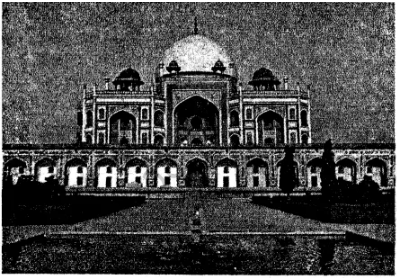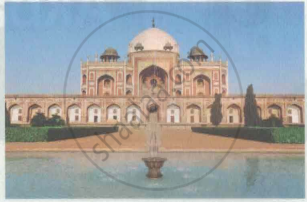Advertisements
Chapters
2: Spread of Christianity
3: Birth of Prophet Muhammad and Spread of Islam
4: The Turkish invasion and the establishment of the Delhi Sultanate
5: Expansion of the Delhi Sultanate : The Khilji and the Tughiaq Dynasties
6: Life under the Delhi Sultanate
7: Rise of the Vijayanagar and Bahmani Kingdoms
▶ 8: Babur, Humayun and Sher Shah
9: Akbar
10: Jahangir Shah Jahan, Aurangzeb
11: Bhakti and Sufi Movements
12: The Constitution and the Preamble
13: Directive Principles of State Policy
![Oxford University Press solutions for The Trail History and Civics [English] Class 7 chapter 8 - Babur, Humayun and Sher Shah Oxford University Press solutions for The Trail History and Civics [English] Class 7 chapter 8 - Babur, Humayun and Sher Shah - Shaalaa.com](/images/the-trail-history-and-civics-english-class-7_6:ec399141fe6948e9977cd123ea08ebe8.jpg)
Advertisements
Solutions for Chapter 8: Babur, Humayun and Sher Shah
Below listed, you can find solutions for Chapter 8 of CISCE Oxford University Press for The Trail History and Civics [English] Class 7.
Oxford University Press solutions for The Trail History and Civics [English] Class 7 8 Babur, Humayun and Sher Shah Fill in the blanks
Fill in the blanks:
Babur lost both ______ and _________ became a homeless wanderer. In 1504 ce, he became the ruler of_______.
Fill in the blanks:
Humayun lacked the ______ necessary to ______ the vast empire he had inherited.
Fill in the blank:
Sher Shah based his administration on the principle of a _______ state.
Fill in the blanks :
Sher Shah went on regular _________ of inspection and set up an efficient ________ system.
Fill in the blanks:
Sher Shah established a large _______ army and introduced several reforms to make it ________.
Oxford University Press solutions for The Trail History and Civics [English] Class 7 8 Babur, Humayun and Sher Shah Match the Columns
Match the following:
| Column A | Column B |
| 1. First Battle of Panipat | (a) Defeat of the Rajput confederacy |
| 2. Battle of Khanwa | (b) Humayun's son |
| 3. Battle of Ghagra | (c) Humayun's brother |
| 4. Akbar | (d) 1526 CE |
| 5. Kamran | (e) Babur's victory over the Afghans |
Oxford University Press solutions for The Trail History and Civics [English] Class 7 8 Babur, Humayun and Sher Shah Choose the correct answer
Choose the correct answer:
In 1522 ce, _____ invited Babur to invade India.
Ibrahim Lodi
Sher Khan Suri
Daulat Khan Lodi
Choose the correct answer:
With the help of the Shah of______, Humayun returned to India in the year 1555 CE.
Persia
Afghanistan
Sind
Choose the correct answer:
Sher Shah divided his empire into 47_______.
sarkars
parganas
villages
Choose the correct answer:
The rupia introduced by Sher Shah was made of ______.
gold
silver
copper
Choose the correct answer:
Sher Shah’s greatest achievement was the construction of ______.
new roads
issuing of coins
his revenue system
Oxford University Press solutions for The Trail History and Civics [English] Class 7 8 Babur, Humayun and Sher Shah True or False
State whether the following is true or false:
Babur was a descendant of Timur and Chenghiz Khan.
True
False
State whether the following is true or false:
Babur’s war-weary and homesick soldiers wanted to return to Kabul after the Battle of Panipat.
True
False
State whether the following is true or false:
Babur won the Battle of Khanwa through treachery and cunning.
True
False
State whether the following is true or false:
Sher Shah ruled for 15 years.
True
False
State whether the following is true or false:
To prevent the officers from becoming corrupt, Sher Shah introduced the system of periodical transfers.
True
False
Oxford University Press solutions for The Trail History and Civics [English] Class 7 8 Babur, Humayun and Sher Shah Answer the questions in one or two words/ sentences
Answer the following question in one or two words/ sentences:
Why did Daulat Khan Lodi invite Babur to invade India?
Answer the following question in one or two words/sentences:
Between whom was the First Battle of Panipat fought?
Answer the following question in one or two words/sentences:
What was the significance of the Battle of Panipat (1526 ce)?
Answer the following question in one or two words/ sentences:
What is the name of Babur’s autobiography?
Answer the following question in one or two words/ sentences:
Who was Humayun’s most dangerous enemy?
Answer the following question in one or two words/sentences:
How did Humayun escape after his defeat in the Battle of Chausa (1539 CE)?
Answer the following question in one or two words/sentences:
How many years did Humayun spend in exile?
Answer the following question in one or two words/sentences:
Who helped Humayan to recover Kabul and Kandahar?
Answer the following question in one or two words/sentences:
What is the significance of the Battle of Kanauj (1540 CE)?
Answer the following question in one or two words/sentences:
How were the affairs of the villages managed during Sher Shah’s reign?
Answer the following question in one or two words/sentences:
Explain the Chehra system in Sher Shah’s military administration.
Answer the following question in one or two words/sentences:
Mention one reason why Sher Shah built an excellent network of good roads?
Oxford University Press solutions for The Trail History and Civics [English] Class 7 8 Babur, Humayun and Sher Shah Answer the questions briefly
Answer the following question briefly:
Give a brief account of Babur’s early life.
Give an account of the causes, events, and consequences of the First Battle of Panipat.
Answer the following question briefly:
How many battles did Babur have to fight after the Battle of Panipat? Mention the significance of his victory in each of these battles.
Answer the following question briefly:
Give a brief account of Sher Shah’s early life.
Answer the following question briefly:
With reference to Sher Shah’s enlightened rule, explain:
How was the central government organized?
Answer the following question briefly:
With reference to Sher Shah’s enlightened rule, explain:
The important features of provincial administration.
Answer the following question briefly:
Sher Shah introduced several measures to make the army disciplined, efficient, and strong. Explain?
Answer the following question briefly:
Discuss the important measures taken by Sher Shah to boost the growth of trade and commerce.
Answer the following question briefly:
What steps did Sher Shah take to maintain law and order in his kingdom?
Answer the following question briefly:
Sher Shah’s greatest achievement was his land revenue system. In this context explain: Land assessments
Answer the following question briefly:
Sher Shah’s greatest achievement was his land revenue system. In this context explain: Taxation policy and its impact
Answer the following question briefly:
Sher Shah is one of the most striking personalities in medieval India. In this context, briefly state the important achievements of his 5-years reign.
Oxford University Press solutions for The Trail History and Civics [English] Class 7 8 Babur, Humayun and Sher Shah Picture study
This is a picture of the tomb of the successor of Babur Picture Given Below

Name the Mughal emperor who is buried in this tomb.
This is a picture of the tomb of the successor of Babur Picture Given Below:

Where is this monument located?
This is a picture of the tomb of the successor of Babur Picture Given Below

In which book could you find a detailed account of Humayun's life? Who wrote it?
This is a picture of the tomb of the successor of Babur Picture Given Below

Why did Humayun spend 15 years in exile?
This is a picture of the tomb of the successor of Babur Picture Given Below

How did Humayun reconquer his lost empire?
Oxford University Press solutions for The Trail History and Civics [English] Class 7 8 Babur, Humayun and Sher Shah Other important questions
Describe the political conditions in India on the eve of Babur’s invasion.
What information do we get from Babur’s memoirs about :
Babur
What information do we get from Babur’s memoirs about :
Babur’s countrymen
What information do we get from Babur’s memoirs about :
Hindustan
Humayun was surrounded by dangerous enemies on all sides. Name any three.
When and how did Humayun lose his empire? When did he return and recapture his lost kingdom?
Humayun lost his empire because of inherent flaws in his character. Explain.
Give reasons to show Babur was a religious tolerant ruler?
When did Humayun ascend the throne and describe the length of the boundaries of the kingdom?
What is Humayunnama?
Mention three important objectives of Sher Shah’s wise and enlightened rule.
Describe briefly the main features of Sher Shah’s communication system?
On which principle administration of Sher Shah was based?
Describe the features of ‘The Grand Trunk Road’ build by Sher Shah during his reign?
What was the duty of Shiqdar and Munsif?
What did Sher Shah do to stop the officials from / becoming corrupt or powerful?
Solutions for 8: Babur, Humayun and Sher Shah
![Oxford University Press solutions for The Trail History and Civics [English] Class 7 chapter 8 - Babur, Humayun and Sher Shah Oxford University Press solutions for The Trail History and Civics [English] Class 7 chapter 8 - Babur, Humayun and Sher Shah - Shaalaa.com](/images/the-trail-history-and-civics-english-class-7_6:ec399141fe6948e9977cd123ea08ebe8.jpg)
Oxford University Press solutions for The Trail History and Civics [English] Class 7 chapter 8 - Babur, Humayun and Sher Shah
Shaalaa.com has the CISCE Mathematics The Trail History and Civics [English] Class 7 CISCE solutions in a manner that help students grasp basic concepts better and faster. The detailed, step-by-step solutions will help you understand the concepts better and clarify any confusion. Oxford University Press solutions for Mathematics The Trail History and Civics [English] Class 7 CISCE 8 (Babur, Humayun and Sher Shah) include all questions with answers and detailed explanations. This will clear students' doubts about questions and improve their application skills while preparing for board exams.
Further, we at Shaalaa.com provide such solutions so students can prepare for written exams. Oxford University Press textbook solutions can be a core help for self-study and provide excellent self-help guidance for students.
Concepts covered in The Trail History and Civics [English] Class 7 chapter 8 Babur, Humayun and Sher Shah are An Overview of the Mughal Empire, The First Battle of Panipat and the Establishment of the Mughal Empire, Babur and Humayun, Sher Shah Suri – the Great Administrator, A Case Study of Akbar and His Times, Jahangir and Nur Jahan, Jahangir’s and Shah Jahan’s Patronage of Architecture, Aurangzeb and His Deccan Policy, The Decline of the Mughal Empire.
Using Oxford University Press The Trail History and Civics [English] Class 7 solutions Babur, Humayun and Sher Shah exercise by students is an easy way to prepare for the exams, as they involve solutions arranged chapter-wise and also page-wise. The questions involved in Oxford University Press Solutions are essential questions that can be asked in the final exam. Maximum CISCE The Trail History and Civics [English] Class 7 students prefer Oxford University Press Textbook Solutions to score more in exams.
Get the free view of Chapter 8, Babur, Humayun and Sher Shah The Trail History and Civics [English] Class 7 additional questions for Mathematics The Trail History and Civics [English] Class 7 CISCE, and you can use Shaalaa.com to keep it handy for your exam preparation.
